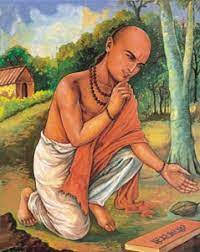Bhaskara was an eighth-century proponent of the Bhedabhada (“identity-in-difference”) school of Indian philosophy.
The Bhedabhada viewpoint recognized three layers of being: Brahman, the Ultimate Reality, and Sakshin, the human being's "witness" awareness.
- They claimed that these three levels were both identical and dissimilar.
- As a result, the universe is similar to Brahman yet, unlike Brahman, is susceptible to change and destruction.
Similarly, although each human soul is equal to Brahman, unlike Brahman, it is subject to bondage and rebirth (samsara).
- The primordial ignorance known as avidya created the soul's bonding, but it may be broken via a mix of action and knowledge (jnanakar- masamucchaya).
- Because they thought that Brahman was really trans- formed into the universe and the Self (parinamavada), the Bhedabhada school's fundamental philosophical issue was that Brahman was susceptible to bondage and ignorance.
- Because the transcendence of Brahman was firmly established by holy writings such as the Upanishads, this concept was difficult to defend, and this issue may explain for the school's brief existence.
You may also want to read more about Hinduism here.
Be sure to check out my writings on religion here.


